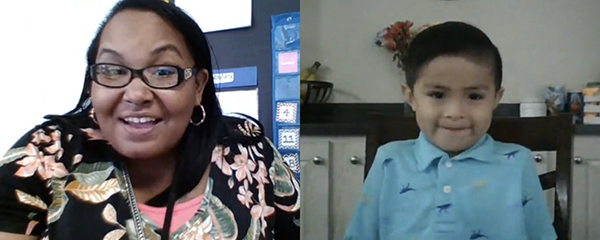Episode 10: Promoting Social Skills in a Virtual Classroom
Shawna Cook, an early childhood educator in a LEAP classroom, applied evidence-based practices used in the classroom to promote social skills during preschool Zoom sessions. (12 min.)
Facilitator Guide
- Early Care and Education Environment Indicators and Elements of High-Quality Inclusion: E3: Social Emotional Learning and Development, E4: Meaningful Interactions with Peers
- DEC Recommended Practices: Interaction, Teaming and Collaboration
As you watch this episode, take note of how Shawna and her team adapt the evidence-based practice of four positive exchanges during routines in a virtual environment.
Reflection Questions
- In the video, the Life Skills and Education for Students with Autism and other Pervasive Behavioral Challenges (LEAP) Program model is mentioned which encourages four social exchanges. The presenter explained how they use the job of the peer greeter to encourage those exchanges. What other activities could you facilitate during virtual instruction to achieve the four social exchanges?
- Partnering with families is especially important when making social interactions happen virtually. What ideas do you have for engaging families to support their children to interact socially during virtual learning?
- In this episode, you see an example of social exchanges involving a child who is non-verbal. What other ways can you encourage multiple social exchanges when one or both children are non-verbal?
- Shawna describes a situation that illustrates how involving parents in the learning activity can make the instruction more successful and meaningful. Think of a lesson that would be enhanced by engaging parents in the instruction and learning. How can you prompt parents to assist with instruction?
- Shawna describes how she and the teacher assistants in her classroom rotate roles so that each educator has the opportunity to lead instruction. Think of types of instruction or activities that are typically only led by the teacher. What support might a teacher assistant, parent, or other classroom instructional partner need to be able to lead that activity? How can a teacher play a supporting role when the teacher assistant is leading an activity?
Group Activity
Promoting Friendship from a Distance
Shawna uses the LEAP Model, an early childhood inclusion program that provides a curriculum to help children develop social relationships. In that program, teachers focus on key social skills that can be taught to children and their classmates to ensure that children interact with each other. Shawna has identified ways for children to practice those skills in a remote environment. Reflect on how the remote environment has affected your own friendships. Discuss and share the following with a partner:
- How have your friendships changed since the beginning of the pandemic?
- What did you do to ensure that your friendships were maintained during times when you were not able to meet face to face?
- What challenges did you encounter in maintaining healthy friendships from a distance and how did you overcome those challenges?
- What did you learn about the friendships in your own life during this time?
- Which of these strategies will you want to continue even when it is possible to meet with friends face to face?
Additional Resources
Practice Improvement Tools
- Teaming and Collaboration Practice Guides for Practitioners (see Team Members Engaging in Quality Communication)

